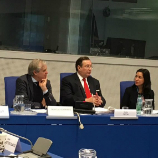 16 December 2016 - Experts gathered in Vienna this week to discuss how countries can treat children who have been recruited and exploited by terrorist and violent extremist groups. The Expert Group Meeting (EGM), organized by UNODC from 13-15 December, covered issues such as preventing the involvement of children with terrorist and violent extremist groups, the suitable justice responses to this phenomenon, and how to promote the effective release and social reintegration of those children.
16 December 2016 - Experts gathered in Vienna this week to discuss how countries can treat children who have been recruited and exploited by terrorist and violent extremist groups. The Expert Group Meeting (EGM), organized by UNODC from 13-15 December, covered issues such as preventing the involvement of children with terrorist and violent extremist groups, the suitable justice responses to this phenomenon, and how to promote the effective release and social reintegration of those children.
More than 30 experts in the field of child rights and counter-terrorism from all regions of the world, especially from countries heavily affected by conflict and terrorism, shared their experiences on challenges and promising practices. These discussions will then help in the development of a UNODC handbook on the topic.
"The recruitment and exploitation of children by terrorist and violent extremist groups has destructive consequences on the lives of children concerned but also on society at large. The scale and nature of the phenomenon call for urgent action," stressed UNODC Deputy Executive Director, Aldo Lale Demoz, recalling the shared responsibility of the international community.
Once in the hands of these groups, girls and boys become victims of brutal violence, exploited for supporting roles, subject to indoctrination, training for combat, sexual exploitation and often exploited as child soldiers in open hostilities, used as spies, or as suicide bombers. Practitioners discussed how to address the complex challenge of preserving public safety and promoting the rights of children involved with terrorist and violent extremist groups.
"Work must continue far beyond the rule of law area, this is a global challenge that requires global action and a global strategy," said Dmitry Titov, Assistant Secretary-General for Rule of Law and Security Institutions in the UN Department of Peacekeeping Operations. "The United Nations System must come together around important initiatives to tackle the challenges at hand, drawing upon our system-wide capacities to respond to violent extremism," Mr. Titov added during the closing session.
Participants at the meeting also included representatives from UNICEF, the Office of the United Nations High Commissioner for Human Rights, the Office of the Special Representative of the Secretary-General on Children and Armed Conflict, as well from NATO and the Office of the European Union Counter-Terrorism Coordinator.
UNODC provides technical assistance to Member States in this field. At the meeting, the key role of UNODC's work was stressed, under the framework of its Global Programme on Violence against Children, and noting the relevance of the forthcoming handbook which will provide policy and practical guidance on treating children who have recruited and exploited by terrorist and violent extremist groups.